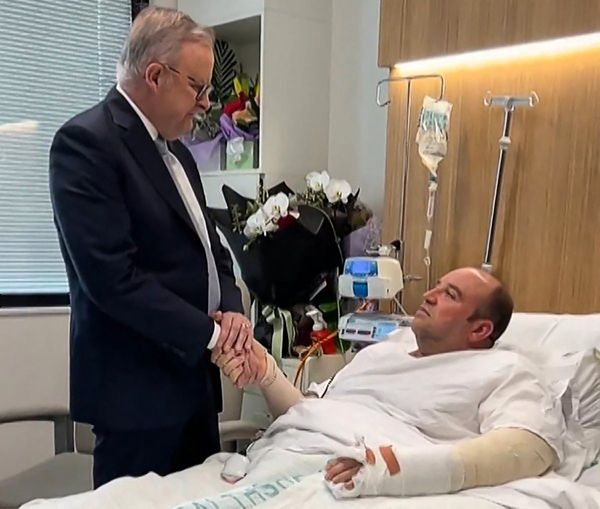
Perhaps it was the new opinion poll that dropped just hours before the final leaders’ debate of the 2022 campaign – the one suggesting Labor was on track to win 80 seats and claim government.
Or perhaps these two men were genuinely chastened after acting like a pair of pugilistic numpties during Sunday night’s poorly moderated shit blizzard on the Nine network.
I’m not sure what triggered the radical change in the disposition of the combatants, but Scott Morrison and Anthony Albanese were visibly nervous at the start of Wednesday night’s debate.
Perhaps the explanation was as simple as two political opponents comprehending the gravity of the moment. The third election debate was a dignified, sober, affair that rose above its mild gameshow atmospherics and, now that the debates are done, only 10 days remain before Australians will decide who governs for the next three years.
Morrison knows his prime ministership is on the clock – the prime minister’s nerves betray his concern that his bag of tactical tricks may not turn this contest. And Albanese also knows a catastrophic stuff-up will end his chances of victory and plunge Labor right back into the despair of election night in 2019.
The final election debate traversed all the predictable topics. But, given that the political debate about wages has dominated the past 48 hours on the hustings, that issue was front and centre.
Albanese again made the case for the wages of Australia’s lowest-paid workers to keep pace with inflation but chose to emphasise the independence of the Fair Work Commission when it came to decision making. While Albanese is making a moral case for fair compensation, he’s also yet to commit to making a submission to the FWC to buttress his own argument.
Scott Morrison for his part is in favour of wage increases as a theoretical proposition but apparently not a wage increase commensurate with the current headline inflation rate because that “can feed into inflation which pushes up interest rates and pushes up the cost of living even more”.
“If Mr Albanese thinks small businesses around the country can have a 5% increase in their wages bill on top of all the other things they’re facing … then people won’t be worrying about what their wages are, they will be worrying about whether they have a job,” Morrison said.
The prime minister is attempting to use this late-campaign wages parable to land the definitive proof point that Albanese is “a loose unit” who makes stuff up as he goes along, and is therefore unworthy of the keys to the Lodge.
“Loose unit” is not language I would deploy in Morrison’s place, not because it’s boorish, but because this cut-through locution surely reminds voters of the surfeit of loose units on his own side.
If we are doing a roll call of loose units we could start with Barnaby Joyce, who before his unfortunate nosebleed unleashed a sequence of incomprehensible analogies at the National Press Club earlier on Wednesday, likening his own government to curtains and Tony Abbott’s safeguard mechanism to a ceiling fan (I think – it was hard to keep up).
At one point during Wednesday night’s debate, Morrison expressed horror or derision-adjacent sentiment about the prospect of the Labor frontbencher Tanya Plibersek possibly serving on the national security committee of cabinet in an Albanese government.
I hate to break it to the prime minister, but I’m reasonably confident this Plibersek eventuality would be significantly less startling for many voters (including many Liberals) than the present reality of Joyce being the NSC’s deputy chair.
But returning to the wages debate – earlier in the campaign, the prime minister argued that Albanese had no power to do anything about wages. Now he’s arguing the Labor leader wants to do too much.
What the prime minister seems to have lost sight of as he attempts to elevate his “Albanese is an unacceptable risk” message is that he is advocating for a real wage cut to make his point, and a real wage cut for the Australians finding it hardest to make ends meet.
This would be a brave stance politically at the best of times but it is particularly brave given there is no evidence wages are generating inflationary pressure in the Australian economy at this point in time – a fact that has been noted consistently by the Reserve Bank.
The central bank has signalled for months that’s a key difference between Australia and other jurisdictions now battling surging inflation.
Real wages in Australia have been going backwards for yonks – that’s a real-world, lived experience that everyone understands, particularly now the price of essential goods and services is rising.
Perhaps that’s why Seven’s audience of undecided voters in key marginal seats gave the final election debate to Albanese.







